Farthest Frontier is the City Builder I Needed
Farthest Frontier is one of those games that sucks you in, making hours fly by like magic. It's charming, though it can be ruthless at times. While it stumbles in a few places, it's an absolute blast to play!
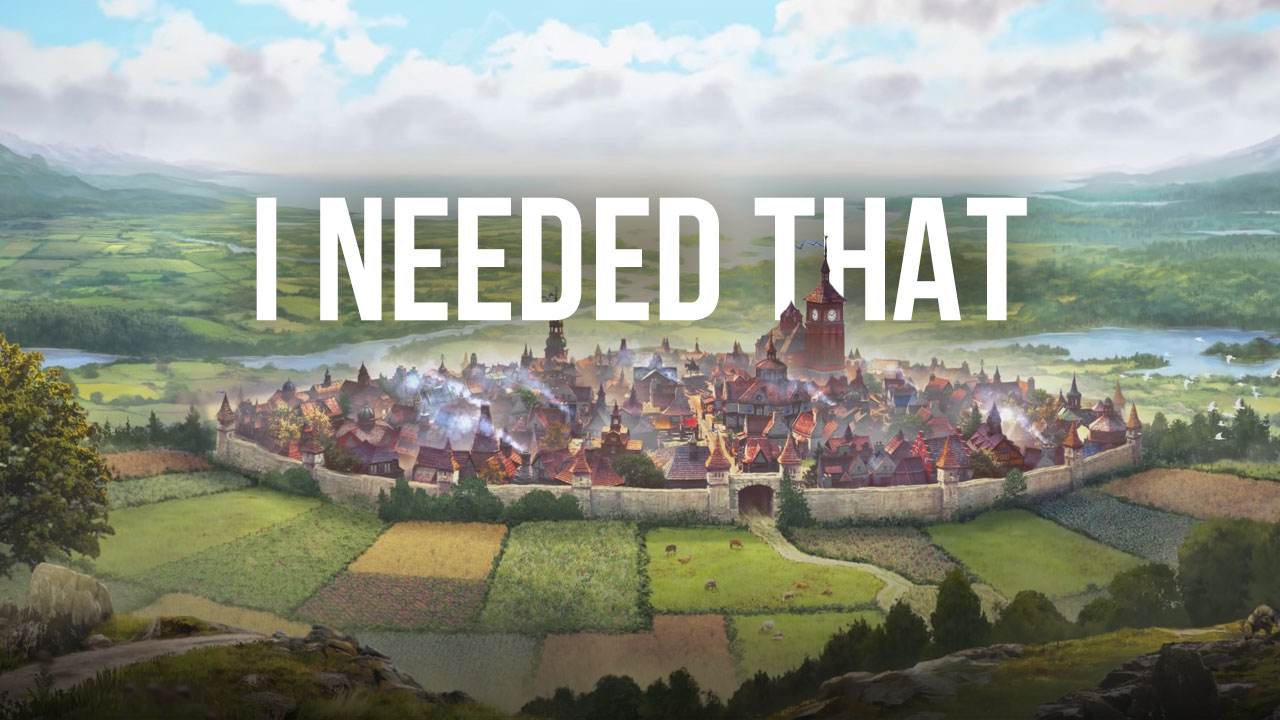
In recent years, quite a few titles have appeared on the market that instead of focusing on large, bustling metropolises, see us manage ordinary, small villages. Those more mean call them "village builders" as compared to classic "city builders" like Cities: Skylines. I, for one, am always grinning like a child with each new cottage built, or when my villagers fall victim to an attack of a ferocious bear.
In opposition to the already iconic Banished, which focused on survival aspects, Farthest Frontier just wants us to have fun with the game. Instead of worrying that all inhabitants will fall prey to hunger during the first winter, I've focused on planning a new fence, simultaneously watching as my female herbalist got eaten by wolves. Another time, I diligently worked on the well layout in my settlement, sometimes casually glancing at one of my miners escaping from a bear. This is not everything our villagers have to worry about. Hunger, disease, bandits, and work accidents complete the picture of the harsh environment in which they need to live.
For this game, i have only one thing to say – it is super-terribly engrossing. Graphics play a major part in this – charming, reminiscent of real-life photos of meticulously-created mock-ups. The feeling is reinforced thanks to a strong blur during full zoom-in. It seems a trifle, but after disabling the blur in the options, the graphics lose a lot of their appeal.
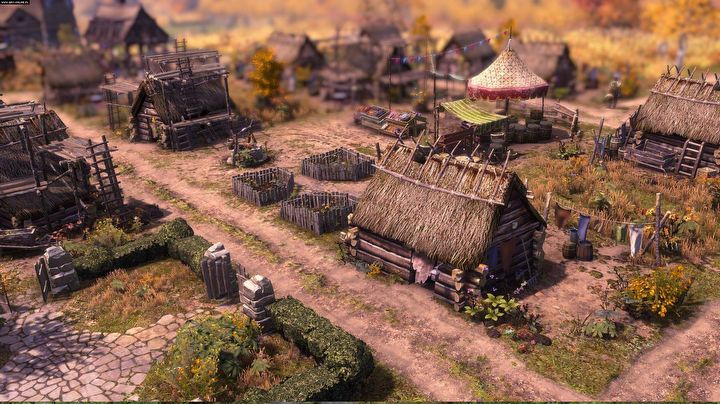
At first, the settlement is rather modest and poor, with wooden cottages and muddy roads. Nevertheless, even at that stage, it is appealing.
Survival builders that are worth your attention
If you liked Farthest Frontier, also check out the following titles:
Banished – a game that pretty much defined the genre. The community calls it the dark souls of city builders, where hunger, cold, and suffering is the only reality your villagers know. And only onions can save the day. Released in 2014, with the graphics today being somewhat outdated, and the number of available buildings and production chains also leaving something to be desired – fortunately, there are mods that partially fix the problem. However, that shouldn't stop you from trying it out.
Manor Lords – a game that has a chance of redefining the genre, with premiere slated for later this year. The style and scale of habitats are similar to what we could see in Farthest Frontier but sprinkled with an additional layer of diplomacy and tactical combat straight from the Total War series. Even in Early Access, the title garnered a lot of attention and we can only hope that Grzegorz Styczen, the developer behind this project, will manage to meet the expectations of the players.
Patron – Banished that is newer, brighter, more colorful and more accessible. A much more complex production with a little less gloomy suffering and more village-building joy. In this title, you have a much bigger chance of creating a real, vibrant, city. Although I must admit, It lacks "something" – i don't know what it is, but it is there.
Ah sweet, quiet, countryside...
All this happened during one chilly, early spring morning. Here and there, the unhurriedly melting snow still lay, and in the meadows, the first plants shyly sprouted. The earth was no longer frozen, so it was back to working the land. A group of residents marched with hoes to the area that was cleared of trees last autumn. For now, bushes were overgrowing everything, but soon this was to become the main food production site for the entire settlement.
Many have probably already seen a steaming bowl of nutritious vegetable soup in their imagination. Optimistically assumed that having a dozen people will easily transform this patch of soil into bustling crops. Why so unusual, yet compelling introduction? It is because the authors from Crate Entertainment decided to approach the topic realistically -in their game, cultivating the soil isn't the hardest part (and it even that requires some serious work) but the wait, as the ground takes more than a year to yield crops. Provided the villagers survive to that moment.
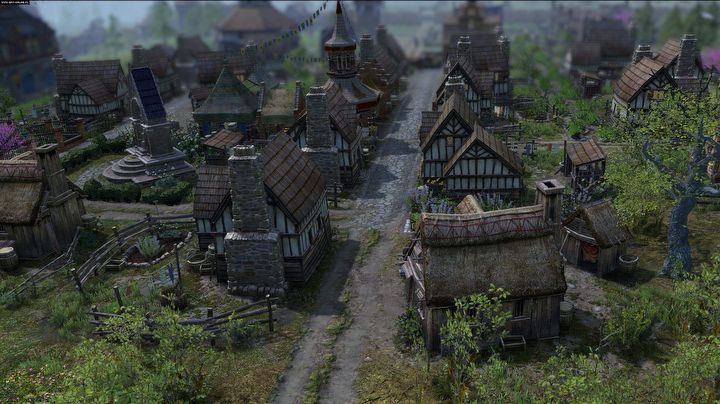
As the months and seasons pass by, our settlement develops and assumes traits of a small town. Developing cobblestone roads and brick houses bring a lot of satisfaction.
But that is a long way from the initial phase of the game – at that time, the player needs to focus on more traditional methods of obtaining food – fishing, hunting, and gathering. Berries, fish, and meat from the surrounding forests will satisfy your villagers at least in the starting phase, but better start the farming process as soon as possible – there will be some time before your crops are ready. Time, that your villagers don't have.
However, when a patch of land is ready for cultivation, a major choice appears – what crops to plant. Farmers switch to different occupations when the season is over, while we find a comfortable place, pull out a spreadsheet, and start planning everything for three years ahead, and with three-field crop rotation. A short break – a bear just got into our peas...
Bears eat peas, bandits steal soap
Wild animals and bandits are two threats that require active defense. A single wolf is not a big problem, especially near a settlement, where there is always someone to help, but a whole pack, a bear, or a group of bandits can cause some serious trouble. Villagers usually do not have weapons or armor, so they engage in a rather unequal battle with the enemy, and their only hope lies in their numerical advantage. Or in defense towers.
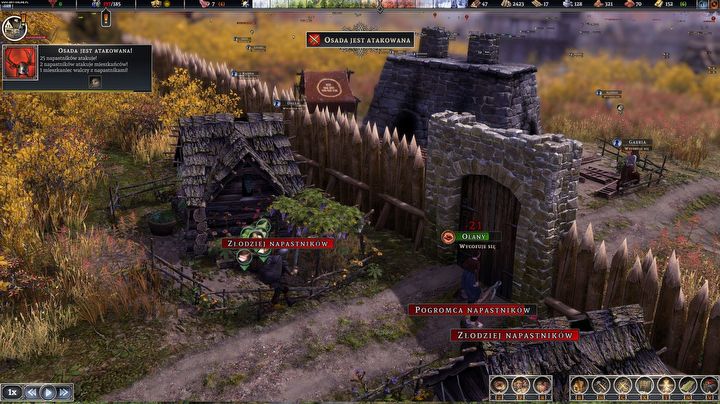
When the gate has closed shut before him, and with invading forces on the other side, Gee understood why he is called that way.
Unfortunately, getting military help costs a lot of money. Sentries stationed on towers are cheaper, but we can't issue orders to them. A garrisoned unit is a serious expense, but in this case, we can lead the group in an RTS-like style. But don't expect much finesse in unit-controlling mechanics.
In the initial phase of a match, a meagre few armed guards will be more than enough to protect the settlement, but it is worth thinking strategically even then. Bears usually look for food, while robbers look for valuables. Therefore, warehouses or production buildings should be placed in easy-to-defend locations. With a little bit of luck, a bear will be satisfied with peas in the first encountered cottage, while bandits will settle on soap found in one of the houses.
Three-field crop rotation, fool!
With this game, I fell in love in agriculture, but the first contact with complex tables and sheets can be a turn-off. A mass of data describing each plant, field statistics, temperature fluctuations, and crop rotation in a three-year system, and on top of that, the risk of plant diseases attacking the player like wolves gang on sheep. However, don't despair – all these bloodthirsty numbers can be tamed and understood. Nevertheless, best to stick to trial-and-error method, as the in-game tips system is one of the more unclear in the history of computer games.
Growing cereals or leeks is immensely effective, but depletes the field very much – c'mon, everybody knows that! On the other hand, leguminous plants and clovers help in fertilizing the soil. And that's basically everything you need to know to be able to handle crops efficiently.
To make managing everything more comfortable, I started building fields in threes, so that each year one of the fields would yield the most valuable crops (e.g. Flax or wheat), the second less depleting food, and the third covered in clover. Three-field crop rotation at its finest.
Perfectionists, beware – the problem is that you may harvest way less than you've planted. If the field isn't fenced, deer will have their way with your crops, while turnips or leeks will start to wither because of various diseases. Add to this unfavorable weather conditions – early frosts and scorching summers.
When farming in Farthest Frontier, you may get the impression that mother nature is determined to make your life miserable.
The game may not be perfect, but I don't give a damn
Every time I launch Farthest Frontier , I lose myself in the game completely and before I know it, several hours pass. However, this is not like i don't see the problems and flaws. And there are a few of them.
The combat mechanics suck. The rain of arrows falling on enemies and the sound of released bowstrings are quite satisfying, but that's about it. Human movement in Farthest Frontier is clumsy and simply artificial, which is especially seen in melee combat. The inhabitants of this universe haven't invented multitasking yet, so they either move or swing weapons. This leads to quite comical chases, in which the pursuers stop every few steps to strike a blow. Before the attack lands, however, the fleeing man or animal has already moved beyond their reach, causing them to interrupt their attack and continue the chase.
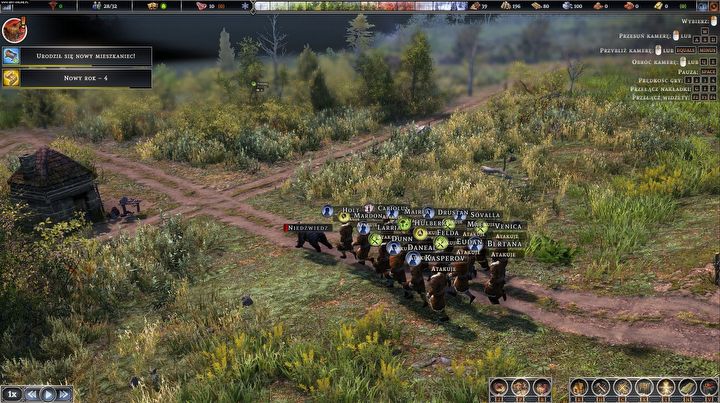
Chase them down! A pursuit after a fleeing target most of the time takes lot of time and allows you to explore large chunks of the map.
There is something wrong with the economy also. We collect taxes through the marketplace, but thats not the main source of income. Real money is made through trade. A single linen shirt can pay the salary of one professional soldier, and the sale of a bunch of herbs gathered in a nearby forest financed the construction of my theater. For new players, understanding the system may be a challenge.
Farthest Frontier shows how very important the forester is in such games. Obtaining wood is not that easy. Although trees grow back on their own, this process is very slow. So we are doomed to either cyclical shifting of the lumberjacks' working area or manually choosing trees to cut when our supplies are low. Both methods are quite tedious, especially when left with the problem of maintaining forest areas in which our foragers and hunters can acquire food.
Ultimately, however, these flaws and shortcomings are not that big of a deal. The game dazzles with its charm which makes me oblivious to faults and I continue to plan the crop rotation, watch villagers being eaten by bears, and be mesmerized by new cobblestone roads. Because that's what Farthest Frontier gives me – simple, childlike joy.
